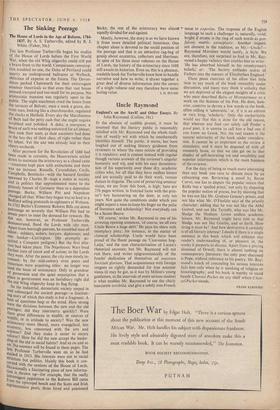The Sinking Peerage
The House of Lords in the Age of Reform, 1784- 1837. By A. S. Turberville, edited by R. J. White. (Faber, 50s.) THE late Professor Turberville began his studies of the House of Lords before the First World War, when the old Whig oligarchy could still put a brave front to the world. Conspicuous consump- tion troubled no one, the Duke of Portland could quarry an underground ballroom at Welbeck, oblivious of expense or the future. The Devon- shires packed Chatsworth for their extravagant amateur theatricals so that even that vast house seemed cramped and too small for its purpose. No aristocratic mansion was regularly open to the public. The night-watchmen cried the hours from the terraces of Belvoir; once a week a grave, dis- creet man, looking like a churchwarden, regulated the clocks at Hatfield. Every day the Marchioness of Bath had the petty cash that she might require scrubbed and polished. A duke, a marquess, a brace of earls was nothing untoward for a Cabinet; they took their seats, as their ancestors had done in the hey-day of their class, of right rather than by talent. Yet the axe was already laid to their cherry orchards.
After payment for the Revolution of 1688 had been made in coronets, the Hanoverians settled down to maintain the aristocracy as a closed caste —creations kept pace with extinctions and there Was no increase. Russells, Cavendishes, Cecils, Campbells, Bentincks—with the bastard families spawned by Charles II—kept a status in society and in politics that approximated more to the Princely houses of Germany than to a dependent Peerage. Burke, William Pitt and Napoleon changed all that. What they began was to lead to a Bedford selling postcards to sightseers at Woburn. In 1782 Burke's Economic Reform Bills cut down Patronage so severely that William Pitt had to create peers to meet the demand for rewards. He did not, however, as Professor Turberville demonstrated, flood the Lords with city men. Apart from borough patrons, he ennobled men of talent : soldiers, sailors, lawyers, diplomats; and one banker—Carrington. (He promptly ac- quired a Conquest pedigree.) But the first dilu- tion had taken place. The Napoleonic Wars bred further men of talent and of action; to the Lords they went. After the peace, the city men slowly in- creased; by the mid-century even poets and historians were acquiring titles : no longer was ]and the basis of aristocracy. Only in grandeur of possession and the quiet assumption that a Place in government was an hereditary right did the old Whig oligarchy keep its flag flying. So the industrial, democratic society seeped in and submerged the ancient peerage—a fascinat- ing Story of which this study is but a fragment. A host of questions leap to the mind. How strong Were the divisions between the new and the old peerages; did they intermarry quickly? Were there great differences in wealth; or sources of wealth; or in attitude to society? Was the new aristocracy more liberal, more evangelical, less eccentric, less concerned with the arts and sciences? Did they make it easier to secure reform? How far did the new accept the leader- ship of the old in social habits? And so on and so 9n. No answers will be found in these pages. The late Professor Turberville went on as he had started in 1913. His interests were not in social structure but politics. Mainly this book is con- cerned with the sessions of the House of Lords. 0.. ccasionally a fascinating piece of new informa- tion is thrown up—for example, that the really intransigent opposition to the Reform Bill came loom the episcopal bench and the Scots and Irish ro Presentative peers, those hired and pensioned
equally divided for and against.
Mostly, however, the story is as we have known it from more detailed political historians. One chapter alone is devoted to the social position of the peerage and that is an attractive rag-bag of gossip about eccentrics, collectors and libertines. In spite of his three stout volumes on the House of Lords, the history of the aristocracy since 1688 still awaits its historian. Even so, this is a pleasant, readable book for Turberville knew how to handle narrative and how to write; it -draws together a great deal of diverse information into the covers of a single volume and may therefore have some
hacks; the rest of the aristocracy was almost "










































 Previous page
Previous page